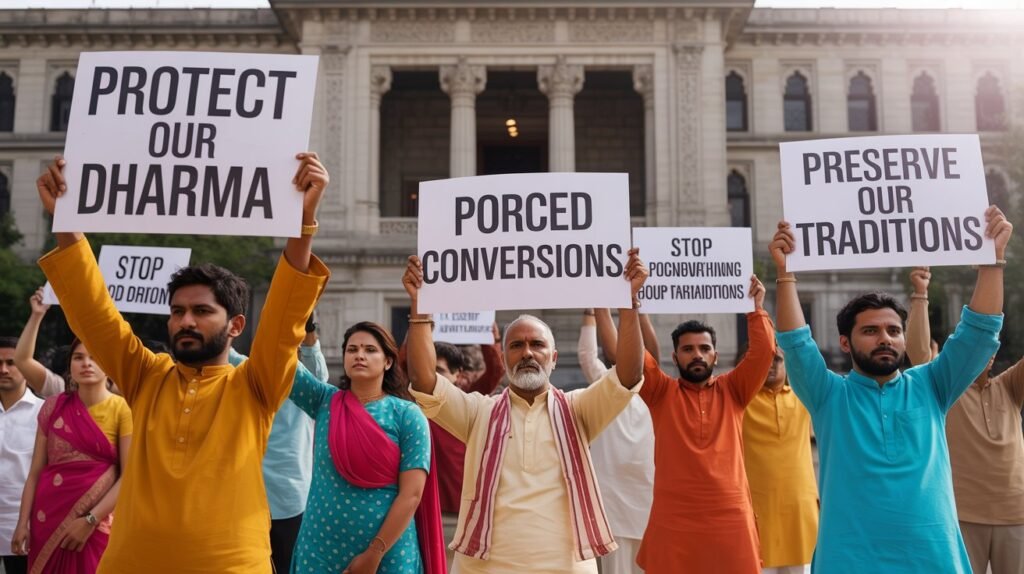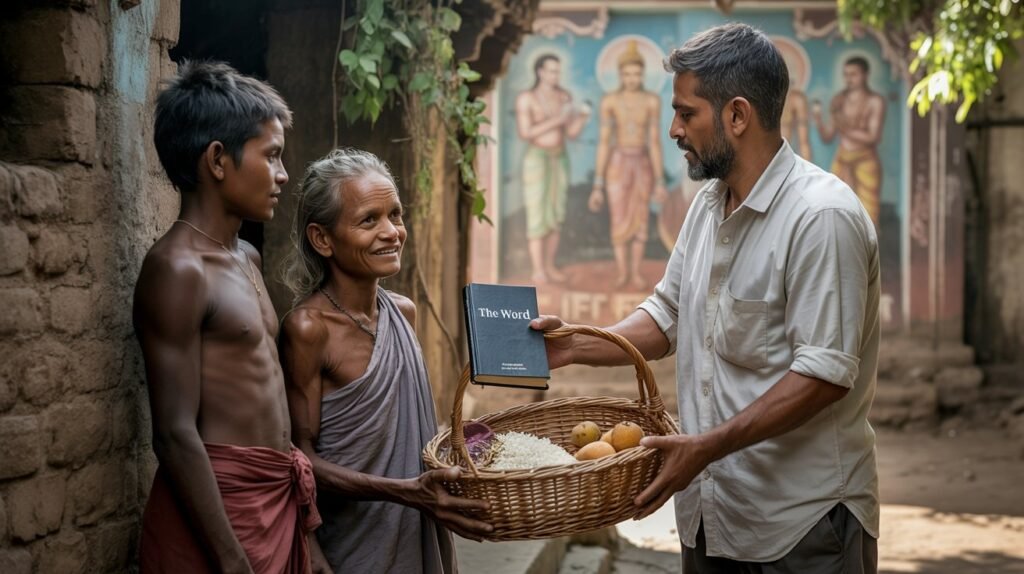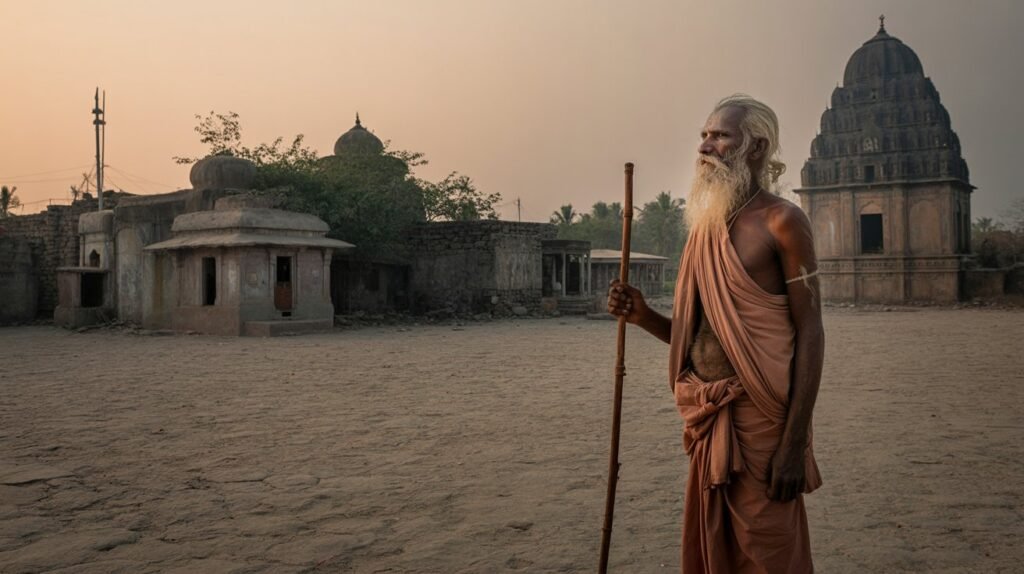Why You Must Know Anti-Conversion Law As A Hindu?
India guarantees freedom of religion under its Constitution, allowing every individual the right to profess, practice, and propagate their faith.
However, over the years, some Indian states have passed laws aimed at regulating religious conversions — particularly those they deem coerced, fraudulent, or induced by allurement or marriage.
These laws are often called “Freedom of Religion Acts”, but they’re more commonly referred to as anti-conversion laws.
Love Jihad / Identity Deception in Interfaith Marriage – A young Hindu woman in traditional attire, standing confused at a crossroads — one side shows a temple and family, the other a masked man holding a marriage certificate. – Pic is Ai generated and is for reference purposes only

Why Anti-Conversion Laws Are a Hindu Civilizational Imperative?
“Just as the state monitors financial fraud, it has a duty to prevent spiritual fraud too — especially when religious conversions have political, demographic, and security implications“.
Hindus Demanding Protection – A peaceful protest scene where Hindu men and women hold placards saying “Protect Our Dharma”, “Stop Forced Conversions”, “Preserve Our Traditions”, set in front of a court building or state assembly.

Anti-Conversion Laws in Indian States: Full Overview
While India has no central anti-conversion law, several states have enacted their own Freedom of Religion Acts, primarily to prevent conversions through force, fraud, inducement, or marriage.
Indian States with Active Anti-Conversion Laws
| State | Law Name / Year | Status | Key Features |
|---|---|---|---|
| Odisha | Orissa Freedom of Religion Act, 1967 | ✔ Active (since 1967) | Requires prior permission for conversion; penalties for force or fraud. |
| Madhya Pradesh | Freedom of Religion Act, 2021 | ✔ Active (revised version) | Prohibits conversion by marriage; prior approval mandatory. |
| Chhattisgarh | Freedom of Religion Act, 2000 & 2006 | ✔ Active | Modeled on MP’s law; prohibits force/fraud; additional district-level rules. |
| Gujarat | Freedom of Religion Act, 2003 (amended in 2021) | ✔ Active | Conversion via marriage prohibited; 2021 amendment stayed by HC. |
| Himachal Pradesh | Freedom of Religion Act, 2006 (amended 2019) | ✔ Active | Requires 30-day prior declaration; expanded marriage-related clause in 2019. |
| Jharkhand | Freedom of Religion Act, 2017 | ✔ Active | Prior declaration to magistrate required; punishable conversion offenses. |
| Uttarakhand | Freedom of Religion Act, 2018 | ✔ Active | Same structure as other BJP-ruled states; covers marriage and allurement. |
| Uttar Pradesh | Prohibition of Unlawful Conversion of Religion Act, 2021 | ✔ Active | Prior declaration; voids conversion-based marriages; severe penalties. |
| Karnataka | Protection of Right to Freedom of Religion Act, 2022 | ✔ Active | Converts via marriage/fraud prohibited; 30-day notice and declaration required. |
States with Laws Passed but Not Implemented
| State | Law | Status | Notes |
|---|---|---|---|
| Arunachal Pradesh | Freedom of Religion Act, 1978 | ❌ Not implemented | No rules were framed, so law has never been enforced. |
| Rajasthan | Freedom of Religion Bills (2006 & 2008) | ❌ Not enacted | Passed by assembly but rejected by Governor / President. |
Missionary Conversion in Tribal Areas – A tribal family receiving food or aid from a Christian missionary while a Bible is subtly extended with the other hand. Hindu deities faded or removed in the background. Pic is Ai generated and is for reference purposes only.

States Without Any Anti-Conversion Law
As of now, many states and Union Territories — especially in South, East, and Northeast India — do not have anti-conversion laws, including:
Most North Eastern states except Arunachal
Tamil Nadu (briefly had a law in 2002, later repealed in 2004)
Kerala
Andhra Pradesh
Telangana
West Bengal
Assam (although discussions are ongoing)
Bihar
Punjab
Goa
Delhi
Common Provisions in These Laws
| Provision | Commonly Present? |
|---|---|
| Prior notice to District Magistrate | ✅ Yes (most states) |
| Prohibition of conversion via marriage | ✅ Yes (esp. recent laws) |
| Declaration from priest/minister of religion | ✅ Yes |
| Punishment for force/fraud/allurement | ✅ Yes |
| Marriages done solely for conversion = void | ✅ Yes (UP, MP, Gujarat) |
Controversies & Criticism – Secularists point of view
Legal Challenges: Several High Courts (notably Gujarat and Karnataka) have stayed parts of these laws. The Supreme Court is hearing consolidated petitions challenging their constitutionality.
Violation of Privacy & Freedom: Critics argue that requiring prior notice or permission violates Articles 25 (freedom of religion) and 21 (right to privacy).
Targeting of Minorities: Many cases under these laws disproportionately involve interfaith couples, particularly where the man is Muslim.
Burden of Proof on Accused: Unlike most criminal laws, these acts often reverse the burden of proof — the accused must prove conversion was voluntary.
Rebutting the Criticism of Anti-Conversion Laws: A Defense
“Violation of Privacy & Freedom”
Counterpoint:
Anti-conversion laws do not ban voluntary conversion. They merely regulate how and why a person is converted — to ensure it is not under fraud, coercion, or inducement.
- Requiring prior declaration is a way to ensure transparency, not control belief.
- Just as the state monitors financial fraud, it has a duty to prevent spiritual fraud too — especially when religious conversions have political, demographic, and security implications.
✳️ Defenders argue that this is about informed consent, not religious restriction.
“Targeting of Minorities”
Counterpoint:
The reality on the ground, especially in rural and tribal areas, shows that Hindu Dalits and Adivasis are often lured with promises of:
- Free education
- Money
- Medical aid
- Foreign visas
- Job opportunities
These inducements are backed by foreign-funded missionary networks, which some claim systematically target vulnerable Hindu communities for conversion.
Many argue: Anti-conversion laws are protective, not discriminatory — they defend Hindus from cultural erasure and religious aggression, especially in demographically sensitive areas like Chhattisgarh and the Northeast.
“Burden of Proof is on the Accused”
Counterpoint:
Yes — and rightly so, say defenders of the law.
- When a person facilitates or promotes a religious conversion, they bear a responsibility to show that it was not exploitative.
- Similar burden-shifting exists in laws protecting women, children, or minorities from abuse — and here, the Hindu majority often plays the vulnerable group.
In practice, anti-conversion laws deter organized, unethical missionary activity — not peaceful religious exchange.
“Personal Choice Should Be Protected”
Counterpoint:
Personal choice is protected — but it is not absolute when that choice may:
- Be manipulated through emotional pressure (e.g., interfaith marriage under false identity),
- Result in social unrest, or
- Be used as a tool for religious expansionism that threatens cultural harmony.
The recent trend of “Love Jihad” — where men allegedly conceal their religious identity to marry Hindu women and convert them — is perceived by many as a form of soft religious warfare, not romance.
Laws are necessary, argue critics, to preserve Hindu identity and protect women and children from being misled in the name of bhai chara.
“These Laws Are Unconstitutional”
Counterpoint:
The Constitution gives the right to propagate religion, but not to convert others by force, fraud, or inducement.
In fact, the Supreme Court in Rev. Stanislaus vs. State of Madhya Pradesh (1977) ruled that:
“The right to propagate religion does not include the right to convert another person.”
Hence, state laws banning forced or deceitful conversion are perfectly constitutional, and arguably necessary.
Conclusion: A Hindu Perspective
From this viewpoint, anti-conversion laws are not about intolerance, but about self-preservation — of a civilizational ethos that has already withstood centuries of invasions, colonization, and religious pressure.

Critics who claim these laws are tools of “majoritarianism” often ignore the lived experiences of Hindu communities — especially the poor, the tribal, and the Dalit — who are the main targets of coercive conversions under the guise of social work, interfaith love, or charity.
In this context, “secularism” becomes a shield, and “brotherhood” becomes a tactic, to change religious identities in ways that erode India’s indigenous spiritual traditions.
Final Thoughts
Anti-conversion laws in India reflect a complex tension between protecting vulnerable hindus and upholding the constitutional right to freedom of religion.
With an increasing number of states adopting similar frameworks — especially since 2020 — the national legal landscape is becoming more restrictive.
However, the implementation varies significantly across states, and some laws (like in Arunachal or the stayed parts of Gujarat’s law) remain ineffective in practice.


